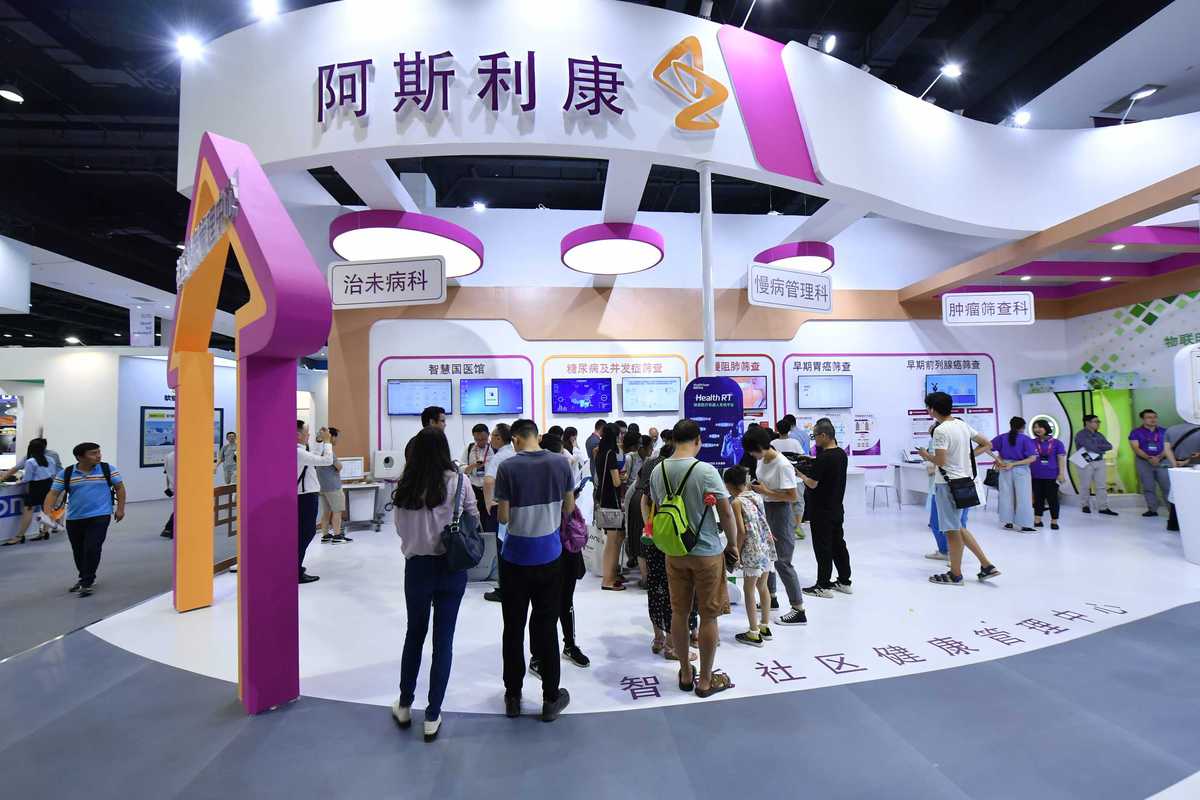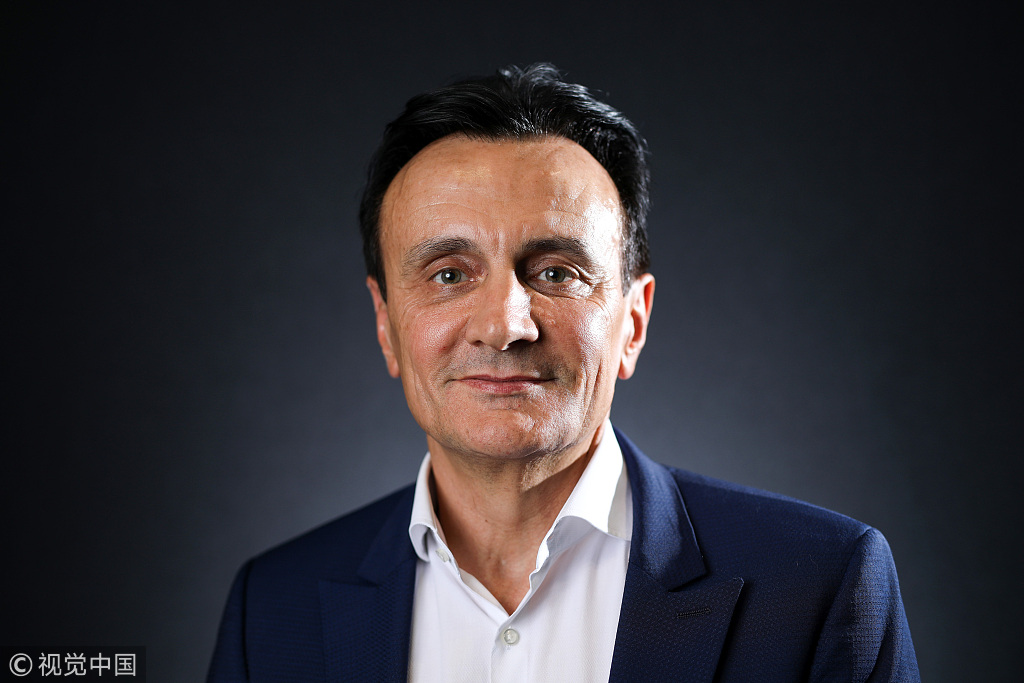Meeting the demand for healthcare


AstraZeneca committed to helping patients in China have better lives
Editor's Note: This year marks the 40th anniversary of China's reform and opening-up. China Daily interviewed top executives of well-known multinational companies for their views on the country's socioeconomic development.
Please use three words to describe China's changes in the past 40 years.
Innovation, globalization and collaboration.
What are the biggest achievements in China since the introduction of the reform and opening-up policy 40 years ago?
Basically, what you can see is that people are richer, people have a better quality of life, and people are able to invest in their own and their families' education and health. I have been coming to China for the last 25 years or more, and you can see here the degree of advancement of science and innovation is miles ahead of what it was 25 years ago. Enormous progress has been made in terms of innovation, the sophistication of the economy, the sophistication of the people and knowledge. All of these flow into more wealth and better quality of life.
What's the biggest challenge China faces today and how can the country overcome it?
With higher economic growth and personal incomes, people are demanding more and better healthcare. The need for precise, personalized and smart treatment with affordable and accessible healthcare services is increasing. This requires higher investment in the medical industry; wider cooperation among the government, hospitals and enterprises; and continuous innovation. It also requires better talent training and improvement of research and development capabilities.
China's central government has announced a series of healthcare reforms to establish a basic, universal health system that can provide safe, effective, convenient and low-cost health services. The reform affects most facets of healthcare delivery, including health insurance, primary care, hospital management, medication and public health. China also encourages cooperation with foreign pharmaceutical companies. All these involve better planning, coordination and cooperation, which is a big challenge for the government.
How has your company benefited from the country's reform and opening-up policy?
We have benefited significantly and we have also contributed significantly. Essentially, our goal is to provide medicines that improve patients' lives. The fact that the economy is growing and the country is developing gives people new aspirations. Thirty or 40 years ago, they wanted to eat, they wanted to have a good job, and they wanted to have a car. Now they have moved on to wanting good healthcare.
With this happening, we have been able to bring faster and better innovation. China has developed very rapidly in the last two to three years. Bringing innovative medicines to China was always a bit of a challenge. It was a slow process. So, Chinese patients would access our medicines three, four, or five years after Western patients. But in the last few years, the process has become totally integrated with the rest of the world.
We have benefited a lot from this. This year we are set to grow 20 percent or more. We have more than 10,000 employees in China. We have done extremely well. We have also been able to bring patients new medicines they need.
In Wuxi, Jiangsu province, we are now trying to not only bring in medicines, but also to provide all kinds of healthcare via the internet of things. For us, it really has been a great coincidence that we are based here in Wuxi, because we are able to totally contribute to the internet of things efforts.
The other development we have benefited from is the people we have here in China now are global people. Twenty-five years ago, it was difficult to take the talent here and send them to the United States or elsewhere, because their English was not good enough. But today, the people we have are really able to work globally and contribute a lot.
China is also able to contribute to the rest of our company. What we do here in internet of things healthcare is cutting-edge. The team here is ahead of the rest of the company in the US or Europe. So it is a completely different situation today, where China is no longer simply a sales branch or a sales office, but part of the global structure of our company.
Has competition intensified between your company and Chinese companies?
Yes, certainly. We have always had competition with local companies. On the one side, with the generic companies, the quality of their products was not always the best, but now their quality is becoming better generally. That's because industry standards are rising; the China Food and Drug Administration is lifting quality and reviewing the quality of all products; and those that don't pass the mark will disappear. So, competition with generic products is going to be tougher, and there will be more pressure on price.
On the other side, we have competition from new products that are invented by local companies. Twenty-five or 30 years ago, there were no local companies inventing new products, or it was very rare. Today, there are many companies coming up with new products. So it is much more competitive in the market. There is no question.
What's the most unforgettable experience you have had in China?
Meeting President Xi Jinping was probably the most unforgettable event I experienced in China. Of course, meeting the president is always something that impresses you, but in that instance, it was very special because of the messages he left us with. His speech was very energizing. He talked about innovation. He talked about bringing China into the global community and integrating it into the global community. He talked about building a harmonious society both in China and globally. He talked about collaboration.
It really struck me. I told people, when I left, it is the first time ever when I have met a politician that I have taken two pages of notes, because I found his speech was very positive. He was very forward-looking, positive and inspiring. So this is probably my most memorable experience here.
Apart from economic development, what progresses in other fields have you witnessed in China in the past 40 years?
Science. In our field, clearly science: biology. It hasn't yet translated into many new products. There are a lot of startup companies coming up with new products but it's not a huge number yet.
But science is progressing rapidly, for instance, in genetics. In Beijing, there is a really strong academic effort in genetics. So I think the science is really quite impressive.
Also technology. The integration of technology with the internet of things being a good example of that. China could potentially be ahead of the rest of the world. Many people and many countries are talking about digitalization, but this is not happening much yet. But it has started to happen here. So I think science and technology are the two most impressive things.
What will be the country's "calling card" in the future?
It's the people. The people are smart, focused on education and working hard. Also this positive approach to doing things better and better. As an entrepreneur, I find the entrepreneurial spirit of people in China is very high. So I think the calling card will be the entrepreneurial spirit and the hardworking nature of the people.

CV
Name: Pascal Soriot
Age: 59
Nationality: France
Career:
2012 onwards: CEO of AstraZeneca
2010-12: COO of Roche's pharmaceuticals division
2009-10: CEO of Genentech, a biotech business
1996-2009: Senior management roles in several major companies around the world
1986: Joined the pharmaceutical industry
Education:
Doctorate in veterinary medicine from the National Veterinary School of Alfort and MBA from HEC Paris



































